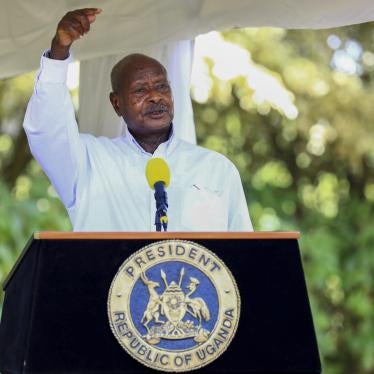This week prosecutors in Uganda finally dropped charges against 218 civilians who were arrested when Uganda’s military raided the palace of Charles Mumbere, the king of the Rwenzururu kingdom, in Kasese, Western Uganda. During the November 2016 raid, the military killed over 100 people, including 15 children.
At the time, Uganda’s government claimed the kingdom sought to secede from Uganda and that the military struck to break up an alleged armed separatist movement. It also argued that the people in the kingdom’s palace, who included young children and many others who worked for the king, were terrorists and were responsible for attacks on police stations in the preceding days.
The authorities indiscriminately arrested Mumbere and scores of others at the palace, including children, and transferred them more than 400 kilometers away to the Nalufenya police station. There, many were severely beaten and interrogated, and later charged with treason, terrorism, and murder. Although authorities released Mumbere on bail in 2017, many others remained in detention until 2021, when the government released over 100 people on bail. More than 60 people remained in detention, awaiting trial, until June 13, 2023.
The 2016 massacre and the mass arrests had a devastating impact on communities in Kasese. After the killings, security officials continued to arrest people accused of being royal guards in Kasese, creating a climate of fear. In 2017, Human Rights Watch found that some families of people killed during the massacre had never received the bodies of their loved ones for burial, despite their requests. Government officials buried at least 52 people in individual graves inside military barracks without identifying the bodies, although some families were still trying to locate their missing loved ones.
The killings and detentions left more than 200 children without a parent, many of whom were the breadwinners in their families, causing great economic harm.
There has been no independent investigation into the use of force by police and military that led to deaths at the palace and elsewhere, and the Ugandan government has failed to identify those responsible and hold them to account, despite numerous calls by Human Rights Watch and others. At the time, government officials said they could not investigate the killings until the arrested civilians were tried.
Almost seven years later, the Kasese massacre should not be forgotten. The Ugandan authorities should finally ensure an independent investigation into the security forces’ conduct, identify those responsible for the massacre, and hold them accountable, as required by Uganda’s international and regional human rights commitments. Anything less will only perpetuate impunity and deny the many families and victims in Kasese the right to the truth they deserve.









